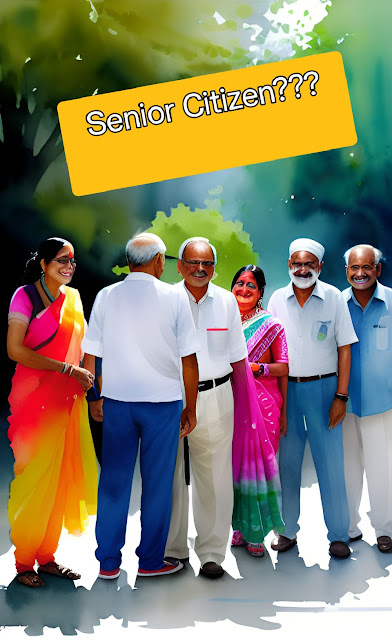Who is called a Senior Citizen in India?
Picture generated by dream.ai
The term ‘Senior Citizen’ is widely used today
both in India and internationally.
Senior Citizen is often used interchangeably
with Senior.
However less than 25 years ago when the
Government of India came out with a policy for older citizens in 1999, it was
termed quite simply as the National Policy for Older Persons.
National Policy for
Older Persons 1999 – A national policy for older persons was first
formulated in the year 1999.
The term ‘Senior Citizens’ was not specifically mentioned for defining
people over 60 years.
Rather in the Section in the Policy on ‘Demographic
Trends’ in para 4, it has been stated that the age group 60-69 years are “often
referred to as ‘not so old’ or ‘young old’ and those in the age 80 years are in
‘very old’ or ‘older old’ category.
It is said in the National Policy (1999)Statement that the “goal of the National
Policy is the well-being of older persons.”
In the Policy Statement
and elsewhere in the document there are many references to the ‘post 60 phase”
and the 60+ phase” indicating thereby
that 60 is the age after which when one is considered as old.
The subsequent National Policy on Older Persons 2011 states “All those of 60 years and above are senior citizens. This policy addresses issues concerning senior citizens living in urban and rural areas, special needs of the ‘oldest old’ and ‘older women”.
The Indian
Ministry for Social Justice and Empowerment is the nodal ministry responsible
for the welfare of Senior Citizens.
The Maintenance and Welfare of Parents and Senior Citizens Act 2007 - An important legislation regarding Senior Citizens is the Maintenance and Welfare of Parents and Senior Citizens Act 2007.
It is an Act of Parliament that received
Presidential Assent on Dec 29 2007 and was published in the Gazette of India
for general information on Dec 31, 2007. As stated therein “It is an Act for more effective
provisions for the maintenance and welfare of parents and senior citizens
guaranteed and recognized under the Constitution and for matters connected
therewith or incidental thereto.”
The Maintenance and Welfare of Parents and Senior Citizens Act 2007 states
in its para ‘2. Definitions’ that “senior citizen” means “any person being a
citizen of India, who has attained the age of 60 years or above”
As per the Income Tax Act of the Govt of India, an individual resident who is 60 years or above in age but less than 80 years at any time during the previous year is a Senior Citizen for Income Tax purposes for the year under consideration. Hence if you are filing your income tax returns for the current year i.e. 2023-24, you should have been 60 years or more, at any time in the previous year 2022-23.
Likewise, a Super Senior Citizen is an individual resident who is 80 years or above, at any time during the previous year for the year under consideration.
Deviations from
the 60-Years limit in certain Government Schemes & in Concessions given to
Senior Citizens:
It is useful for us Senior Citizens to be
aware that there are certain beneficial schemes and other concessions for
Senior Citizens that can be availed
by people less than 60 years of age subject to certain conditions.
Two such important schemes i.e. the Senior
Citizens Savings Scheme and Rail fare concessions and the deviations from the
60-year age limit therein are given below:
The Senior Citizens Savings Scheme – The Senior
Citizens Savings Scheme is a Government of India-sponsored Savings Scheme that
aims to provide a safe guaranteed income to senior citizens and retirees. The
minimum deposit is Rs.1000 and the maximum is Rs.30 Lakhs.
Who can avail of the Senior Citizens Savings Scheme??
(i) An individual above 60 years of age.
(ii) Retired
Civilian Employees above 55 years of age and below 60 years of age, subject to the condition that investment to be
made within 1 month of receipt of retirement benefits.
(iii) Retired
Defence Employees above 50 years of age and below 60 years of age, subject to the condition that investment to be
made within 1 month of receipt of retirement benefits
Fare Concession provided by Indian Railways – The Railways was providing fare concession in all Mail / Express including Rajdhani / Shatabadi / Jan Shatabadi trains for senior citizens aged Female - 58 years and Males 60 years and above. The element of concession was 40 % for Males and 50 % for females.
The concession on rail fare for Senior Citizens has however been put on hold since the COVID period.



